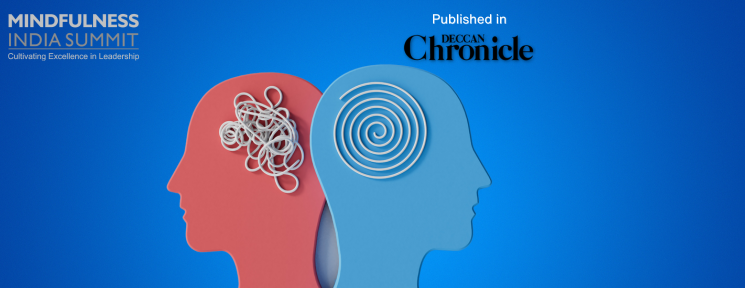Contact Form !

Overcoming Depression and Reclaiming Happiness
 Article Written by Manish Behl – A Global Authority on Mindfulness, Mental Health and Leadership
Article Written by Manish Behl – A Global Authority on Mindfulness, Mental Health and Leadership
Have you ever felt sad or low for a few days, and someone asked you why you were depressed? Although sadness or feeling low is a normal emotion that everyone experiences at some point in life, depression is a different and complex illness that can affect your quality of life in many ways.
“Depression doesn’t take away your talents—it just makes them harder to find ”– Lady Gaga, Singer
According to the World Health Organization, over 264 million people have depression, making it the number one cause of disability worldwide.
Depression can affect anyone, regardless of age, gender, or background. It’s a mood disorder that changes how you think, feel, and act. Depression can make it hard to perform everyday activities, such as work, study, socialize, or find enjoyment. It can also increase the risk of physical illness or self-harm.
But how do you know if you or someone you love has depression? How do you seek help and recover from depression? And what are some common causes and symptoms of depression? In this article, we will address these questions and provide helpful tips for dealing with depression.
According to the World Health Organization, over 264 million people have depression, making it the number one cause of disability worldwide.
Recognizing the Signs of Depression:
Depression is a mood disorder that can affect a person’s thoughts, feelings, and behaviors. It can be observed as a persistent and pervasive feeling that makes it difficult to carry out daily activities.
People with depression may experience some of these signs and symptoms:
Feeling sad, hopeless, worthless, or guilty most of the time
Losing interest or pleasure in activities that were once enjoyable
Having trouble sleeping or sleeping too much
Eating more or less than usual
Feeling tired or lacking energy
Having trouble concentrating or making decisions
Thinking about death or suicide
If you or anyone you know has experienced these signs for more than two weeks, it may indicate depression, and seeking professional help is advisable.
Common Causes of Depression:
The exact reasons why some people become depressed while others do not are uncertain. While talking about the subject of mental health and her own experience with depression, well-known actress Deepika Padukone said:
I was on a career-high, and everything was going well, so there was no reason or no apparent reason why I should have felt the way I was feeling, but I would break down for no reason. There were days when I just didn’t want to wake up, I would sleep because sleep, for me, was an escape. I was suicidal at times – Deepika Padukone
Depression can occur without any apparent cause and can remain hidden from the affected person. However, it can be triggered by challenging or unfavorable situations in life or at work. Depression can arise from a combination of factors, including:
Experiencing a traumatic event, such as abuse, neglect, or violence]
Having a family history of depression or other mental health disorders
Having a chronic illness or experiencing physical pain
Having hormonal imbalances, particularly in women
Engaging in drug or alcohol abuse
People with depression may experience some of these signs and symptoms:
Feeling sad, hopeless, worthless, or guilty most of the time
Losing interest or pleasure in activities that were once enjoyable
Having trouble sleeping or sleeping too much
Eating more or less than usual
Feeling tired or lacking energy
Having trouble concentrating or making decisions
Thinking about death or suicide
If you or anyone you know has experienced these signs for more than two weeks, it may indicate depression, and seeking professional help is advisable.
Some of the options you can consider are:
Talking to someone you trust, such as a friend, family member, or coworker
Consulting with your doctor or a mental health expert, such as a psychologist or psychiatrist
Taking medication prescribed by your doctor
Attending therapy or counseling sessions
Joining a group or community of individuals who have experienced depression
The best option for you may depend on your preferences and comfort level. You may also benefit from combining different options or exploring alternative approaches until you find what works best for you. The important thing is to take action and maintain hope.
Mindfulness: A Powerful Tool for Dealing with Depression
Research shows that mindfulness can be as effective as medication in preventing, recovering from, and reducing depressive symptoms, offering hope to those battling depression. Mindfulness is a valuable tool that complements other depression treatments. Here are a few ways you can practice mindfulness in dealing with depression:
Accept depressive feelings and thoughts: Rather than avoiding or resisting them, try accepting them without judgment. Recognize and embrace what’s present without wishing to change the past.
Create distance from depressive thoughts: Instead of letting them drag you down, imagine them as passing clouds. Avoid engaging or attaching to them.
Focus on the present: Increase awareness of the present moment by practicing mindfulness techniques. Notice sensations, breathe deeply, listen to sounds, and observe your thoughts. Free yourself from dwelling on the past or worrying about the future.
Practice self-compassion: Be kind to yourself and remember that you are not alone. Use loving-kindness meditation to send positive wishes to yourself and others. Understand that everyone makes mistakes and does their best.
Be patient with yourself while practicing mindfulness. It is normal to face challenges and distractions at first. Mindfulness is a skill that develops over time.
Finally
During the Mindfulness India summit held in Mumbai, Ms. Neerja Birla engaged in a conversation with Summit founder Manish Behl, highlighted the issue of people feeling ashamed to share about their mental illness and suffering in silence. She emphasized the importance of individuals coming forward and openly discussing their problems.
“It is okay to have depression, it is okay to have anxiety, and it is okay to have an adjustment disorder. We need to improve the conversation. We all have mental health in the same way we all have physical health.” – Prince Harry
Remember that depression can happen to anyone, so it’s crucial to be open to talking to friends and family and not hesitate to seek help from professionals, support groups, and available resources. If you notice someone in your family, friend circle, or colleagues who you think might be going through depression, show kindness towards them and gently guide them to seek professional help. Mindfulness complements other treatments and provides lifelong tools for regaining control. Practice mindfulness daily to improve your mental resilience. You deserve happiness and good health. Take steps towards a better life.
This insightful article was written by the eminent Mindfulness and Emotional Expert, Manish Behl, and was originally featured in the esteemed News publication of the Deccan Chronicle
About the Writer: Manish Behl

A distinguished Mindfulness Teacher and a leading authority on Mindfulness and Emotional Intelligence. A TEDx speaker, neuroscience enthusiast, and certified Leadership Coach (ICF–PCC), Manish combines ancient Indian wisdom, and practical knowledge with scientific insights, making him a world’s leading voice on Mindfulness.
Write to him : hello@mindfulsciencecentre.com
Follow him on : Linkedin || Twitter || Instagram || Facebook
 A global premier event on Mindfulness happening on April 2024, Don’t miss this opportunity to shape our future and to learn the latest tools, insights, and practices of Mindfulness, Emotional Intelligence, and Neuroscience. Register Now
A global premier event on Mindfulness happening on April 2024, Don’t miss this opportunity to shape our future and to learn the latest tools, insights, and practices of Mindfulness, Emotional Intelligence, and Neuroscience. Register Now








